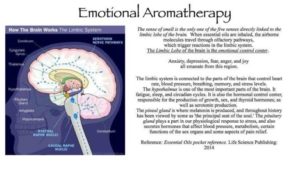Written by Lindsay Williamson, MS, Occupational Therapist
Essential oils have been around since the beginning of time. It’s likely you have heard, use peppermint tea to help soothe an upset stomach, or frankincense and myrrh referenced in the Bible, or eucalyptus in vapor rubs to open airways. Lately though, oils have made a comeback and are gaining popularity in social media, grocery stores, gyms and even some hospitals. It almost feels like a “fad” or “the thing” which makes some people resistant to trying or even learning about essential oils. Understandable.
There is science behind these highly volatile aromatic compounds that proves these are more than a trend or something that smells good. With our country’s lack of preventative healthcare, it’s not surprising people are taking their health into their own hands and turning to these oils for support with their immune system, mental health, head tension, muscles aches, ear pain and more. Essential oils are lipids, this makes them able to penetrate cell membranes to support our immune system in ways that modern medicine cannot. Essentially, essential oils increase the body’s ability to heal itself. Unlike more conventional medicine, they do more than mask the symptoms. We all have the power to heal from within, the body was designed to live and thrive without synthetic support, unfortunately, our environments have limited these capabilities.
Whether you are looking to increase your exercise performance with peppermint essential oil, wanting to support your immune system with cinnamon and clove, or calm the mind or sleep better with lavender, there are many ways to support the body. They are part of the multi-faceted approach to health and not a magic bullet to correct all health issues.
Briefly, how essential oils work, three ways:
Aromatically, topically and orally*
Essential oils work through your olfactory system when inhaled aromatically. This is helpful for both emotions and physical discomforts.
Essential oils can by applied topically and enter the bloodstream in less than 30 seconds. They are composed of many chemical constituents and therefore 1 drop can be helpful for different ailments to improve health at a cellular level. Does this make you think twice about what you put on your body?
Essential oils can be taken orally but this is often controversial and please use caution. *I do not recommend this unless you have highly researched the company of oils you use, and trust it’s purity and potency.
For more information on how essential oils can support your mental and physical health, attend a free educational class on Sunday, January 29th at 10:30am; Monday, January 30th at 6:30pm; or Tuesday, January 31st at 7pm at Mallard Creek Community Room (8350 Golden Valley Road, Golden Valley). Otherwise contact Lindsay Williamson, MS, OTR/L at Lgwilliamson14@gmail.com
Please note, with the recent surge in popularity and the lack of industry regulation, not all oils are created equal. Companies can dilute the oils with synthetics or claim that they are a specific oil when really they have filled the bottle with a cheaper completely different plant’s oil to reduce costs. This results in a significantly impacted product that lacks potency and effectiveness and therefore therapeutic benefits. Please do your research and invest wisely for your own health, well-being, and safety but also for the good of the environment.
Sources:
Bachir, R. G., & Benali, M. (2012). Antibacterial activity of the essential oils from the leaves of Eucalyptus globulus against Escherichia coli and Staphylococcus aureus. Asian Pacific Journal of Tropical Biomedicine, 2(9), 739-742. doi:10.1016/s2221-1691(12)60220-2
https://www.ncbi.nlm.nih.gov/pmc/articles/PMC3607906/pdf/1550-2783-10-15.pdf
https://www.ncbi.nlm.nih.gov/pubmed/25050303
Li, Y., Lai, Y., Wang, Y., Liu, N., Zhang, F., & Xu, P. (2016). 1, 8-Cineol Protect Against Influenza-Virus-Induced Pneumonia in Mice. Inflammation. doi:10.1007/s10753-016-0394-3
Rodriguez, T. (2015, January 16). Essential oils might be the new antibiotics. The Atlantic. Retrieved from http://www.theatlantic.com/health/archive/2015/01/the-new-antibiotics-might-be-essential-oils/384247/.
Essential oils have been around since the beginning of time. It’s likely you have heard, use peppermint tea to help soothe an upset stomach, or frankincense and myrrh referenced in the Bible, or eucalyptus in vapor rubs to open airways. Lately though, oils have made a comeback and are gaining popularity in social media, grocery stores, gyms and even some hospitals. It almost feels like a “fad” or “the thing” which makes some people resistant to trying or even learning about essential oils. Understandable.
There is science behind these highly volatile aromatic compounds that proves these are more than a trend or something that smells good. With our country’s lack of preventative healthcare, it’s not surprising people are taking their health into their own hands and turning to these oils for support with their immune system, mental health, head tension, muscles aches, ear pain and more. Essential oils are lipids, this makes them able to penetrate cell membranes to support our immune system in ways that modern medicine cannot. Essentially, essential oils increase the body’s ability to heal itself. Unlike more conventional medicine, they do more than mask the symptoms. We all have the power to heal from within, the body was designed to live and thrive without synthetic support, unfortunately, our environments have limited these capabilities.
Whether you are looking to increase your exercise performance with peppermint essential oil, wanting to support your immune system with cinnamon and clove, or calm the mind or sleep better with lavender, there are many ways to support the body. They are part of the multi-faceted approach to health and not a magic bullet to correct all health issues.
Briefly, how essential oils work, three ways:
Aromatically, topically and orally*
Essential oils work through your olfactory system when inhaled aromatically. This is helpful for both emotions and physical discomforts.
Essential oils can by applied topically and enter the bloodstream in less than 30 seconds. They are composed of many chemical constituents and therefore 1 drop can be helpful for different ailments to improve health at a cellular level. Does this make you think twice about what you put on your body?
Essential oils can be taken orally but this is often controversial and please use caution. *I do not recommend this unless you have highly researched the company of oils you use, and trust it’s purity and potency.
For more information on how essential oils can support your mental and physical health, attend a free educational class on Sunday, January 29th at 10:30am; Monday, January 30th at 6:30pm; or Tuesday, January 31st at 7pm at Mallard Creek Community Room (8350 Golden Valley Road, Golden Valley). Otherwise contact Lindsay Williamson, MS, OTR/L at Lgwilliamson14@gmail.com
Please note, with the recent surge in popularity and the lack of industry regulation, not all oils are created equal. Companies can dilute the oils with synthetics or claim that they are a specific oil when really they have filled the bottle with a cheaper completely different plant’s oil to reduce costs. This results in a significantly impacted product that lacks potency and effectiveness and therefore therapeutic benefits. Please do your research and invest wisely for your own health, well-being, and safety but also for the good of the environment.
Written by Lindsay Williamson, MS, Occupational Therapist
Sources:
Bachir, R. G., & Benali, M. (2012). Antibacterial activity of the essential oils from the leaves of Eucalyptus globulus against Escherichia coli and Staphylococcus aureus. Asian Pacific Journal of Tropical Biomedicine, 2(9), 739-742. doi:10.1016/s2221-1691(12)60220-2
https://www.ncbi.nlm.nih.gov/pmc/articles/PMC3607906/pdf/1550-2783-10-15.pdf
https://www.ncbi.nlm.nih.gov/pubmed/25050303
Li, Y., Lai, Y., Wang, Y., Liu, N., Zhang, F., & Xu, P. (2016). 1, 8-Cineol Protect Against Influenza-Virus-Induced Pneumonia in Mice. Inflammation. doi:10.1007/s10753-016-0394-3
Rodriguez, T. (2015, January 16). Essential oils might be the new antibiotics. The Atlantic. Retrieved from http://www.theatlantic.com/health/archive/2015/01/the-new-antibiotics-might-be-essential-oils/384247/.


